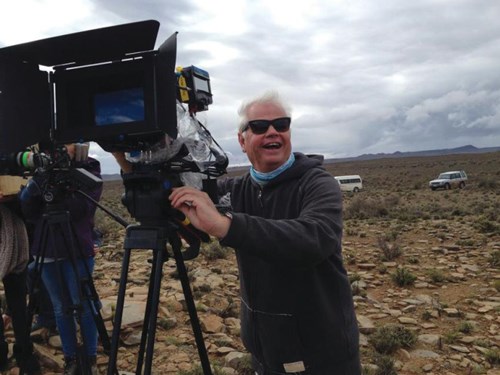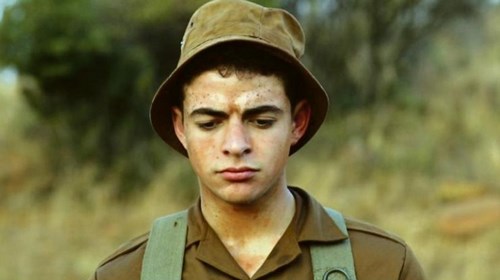Darrell Roodt's Seun is one of the most important and relevant films ever made in South Africa, following in the tradition of his superb Faith's Corner, revealing the fragile disposition of a young man whose life is changed when he joins the army in 1981.
Having met Darrel years ago and forever inspired by his fervent passion for storytelling and filmmaking, it was great to share a few thoughts with him on Seun.
What inspired you to write Seun?
Strangely, the basic idea was one of the first things I ever wrote, way back in the day when I was conscripted into the army. I made The Stick instead, which was easier to get made because it had lots of shooting and horror in it. Then, at the beginning of last year, Diony Kempen, my friend and producer, said that instead of sitting around on our hands waiting for something to happen, let's go and make a movie. I wrote Seun in a week and a couple of weeks after that we were shooting it! But, in truth, it's been almost 30 years in gestation. Weird!
It is an incredibly heartfelt and passionate journey. Is it a film that is very personal to you?
Well, as I said, I was one of the unfortunate bunch who were conscripted into the army for two years, so I was able to draw from that experience. Strangely, no films have been made about the effects of that ill-conceived Border War and the (white) troops who were forced to fight in it. For me, it's interesting that we experienced the other side of the equation: the white kid thrust into a situation that was way beyond his control. It was a wretched business and Seun explores an extreme version of the consequences of a war that should never have been fought in the first place.
Seun reminds me of one of my favourite South African films of all time, Faith's Corner. In both films you give voice to issues that most people shy away from: disability in Seun and the homeless in Faith's Corner. Your views on this?
Those are always interesting characters to explore. Because they are at the very bottom of the heap they are rarely given any kind of voice or point of view. The creatures best left to the shadows. But, of course, their will to live is always the stuff of extraordinary drama. Faith's Corner, for instance, as much as I am proud of the film, I think I made an error in making it a silent film and wish I could make it again. With a voice, this time! Maybe I will.
I do find a lot of Terrence Malick's influence in your skilled crafting of Seun. Is Malick an influence in your life?
Terrence Malick is the ultimate filmmaker's filmmaker. I have watched all his films countless times and there is no other filmmaker who puts his characters in such definitive landscapes. Terrence Malick would love the Karoo. But, beyond that, his poetic way of exploring characters - who don't do very much in truth - is always inspiring. I would like to think that Seun is a cousin of The Tree of Life.
Do you also have a great symbiosis with your cinematographer and editor?
William Collinson is a truly gifted cinematographer. He's able to take my direction and turn it into something transcendental. I worked with him on The Ballad of Robbie de Wee, which very few people saw - a crushing disappointment because we really tried to transcend the genre and give it deeper resonance. But we took that synergy and translated it into Seun, which I truly believe works on an inner power in the images. As I said, the search for transcendental cinema.
The editor, Byron Davies, was also a joy to work with - he was truly in sync with what we were attempting on the set. He would sit and stare at the editing screen for hours, literally talking to the characters, as he guided them through the story. He didn't just join a wide shot to a close-up like most South African films (that win the editing awards at the SAFTAs) I used to love watching him edit.
I equally find your choice of music incredibly fitting, using songs like Ek Verlang Na Jou en Al Le Die Berge Nog So Blou in particular. What inspired your choice of music?
Sonja Heroldt was a big hit when I was in the army, so I loved using that on the level that its meant to be - binding the love story in a coy and innocent way - while subverting it at the same time. I love the scene where he screams at his mother to turn it off because he can't. It seems as if that song was not that innocent after all! Al Le Die Berge Nog Blou was just the right heartfelt anthem to compound the pain of the story. Bitter sweet.
The rest of the music was fun to explore,too. I did it with my friend Ivan Milborrow. Because the film was experimental and 'arty', we went an entirely different route and, I believe, there' s something exceptional about the music too. It's so different from traditional scoring.
You have great command of your cast in Seun. It felt as if you never intruded on their space, but allowed their performances to break through their characters and touch our hearts. Your views on this?
The trick is to eavesdrop on your characters, no matter what movie you make. It's almost an impossible thing to do because of the very artificial nature of movies. But with Seun we were a small crew and a small band of merry actors, and there was more freedom to do this,away from the big lights and crews of a normal set. Also, because of the subject matter, the cast also invest more of themselves into it because they're not making yet another romantic comedy.
Seun is a difficult subject to tackle, and one you bravely took on. Your views on this?
I wish we made more serious-minded films in South Africa but we don't. So, because of the low-budget nature of the project, I was allowed to explore a subject that is otherwise frowned upon by the traditional avenues of funding in South Africa. The thing is, I truly believe that audiences would respond to films like Seun.
Do you find that as a writer and director you have more control over your vision for a film like Seun?
It definitely helps, makes the 'authorship' more complete. However, I do believe that actors have a greater understanding of your characters - even though you might have written them - and I always defer to their instinct. I'm such a liar!
Was it a difficult film to make? Tell me a little about how it grew from page to screen.
Despite the harsh environment and the unseasonal weather (it was like winter in summer), it was the most joyous film I've ever made. Every shot, every performance, just worked.
What do you hope audiences will take home with them after watching Seun?
I think it's got a lot of depth, from the story to the cinematography, to the political ideology -like all good films,you will think about it long after you've seen it. Or you might hate it and dispose of it immediately. That's up to you.
Seun follows on the heels of Treurgrond, also dealing with an issue people tend to stay away from. Do these films signify a specific turning point in your career?
I've always been interested in South Africa as a background for my movies. It's ever-changing and ever-fascinating. Seun is made with the same passion and commitment as Treurgrond, Faith's Corner, Yesterday and so on.
Tell me about your next film.
It's a romantic comedy! Such is the life of a South African filmmaker!
Any views you would like to share?
Make films that count!



















































